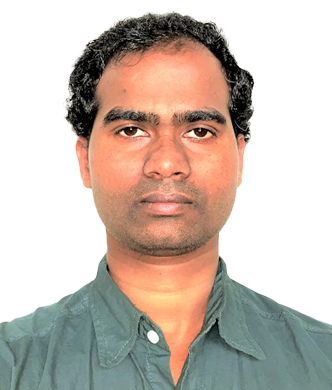
Bhaskar Paidimuddala
Assistant Professor
bhaskar.paidimuddala@mahindrauniversity.edu.in
Bhaskar Paidimuddala obtained his M.Sc. in Biochemistry (Gold medalist) from Sri Venkateswara University, Tirupati. He qualified in various national level exams: ICMR-JRF, CSIR-UGC NET and GATE. With the support of ICMR fellowship, he did his Ph.D. in the Department of Biotechnology, Indian Institute of Technology Madras, Chennai. His Ph.D. work was focused on the Biochemical and Structural characterization of Xylose Reductase from a novel yeast, Debaryomyces nepalensis in the scope of development of enzyme-based bioprocess for the production of xylitol, a natural sugar substitute for the diabetic patients.
He did his first post doc (2018–2019) specialized in structural biology at Boston Children’s Hospital/ Harvard Medical School, Boston, USA, where he was well trained in negative electron microscopy and novel protein structure determination procedures. His second postdoc (2019–2023) specialized in Immunology was carried out at Oregon Health & Science University, Portland, USA. His research work on NAIP-NLRC4 Inflammasome that confers immunity against pathogenic bacterial infections revealed the unprecedented molecular mechanisms of inflammasome activation and bacterial flagellin induced immune response. During his postdoc, he acquired the skills in mammalian cell-based protein expression and purification, inflammasome related functional assays and cryo-electron microscopy.
He joined the Centre for Life Sciences at Mahindra University as an Assistant Professor in March 2024. His current research focuses on the elucidation of human inflammasome signalling pathways and functional roles of NLR family proteins using cellular, biochemical and structural approaches for the development of effective therapeutics to treat the inflammasome associated immune diseases and cancers.
Ph.D.
Ph.D. Biotechnology (Specialized in Biochemistry & Structural Biology), Indian Institute of Technology Madras, Chennai, India. (2012–2018)
M.Sc.
M.Sc. Biochemistry, Sri Venkateswara University, Tirupati, Andhra Pradesh, India. (2010–2012)
B.Sc.
B.Sc. Biotechnology, Sri Venkateswara University, Tirupati, Andhra Pradesh, India. (2007–2010)
2024- Present
- 2024- Present Assistant Professor Center for Life Sciences Mahindra University.
2019–2023
- Postdoctoral Scholar, Department of Chemical Physiology and Biochemistry, Oregon Health & Science University, Portland, OR, USA.
2018–2019
- Postdoctoral Research Fellow, Department of Biological Chemistry and Molecular Pharmacology, Program in Cellular and Molecular Medicine, Boston Children’s Hospital/ Harvard Medical School, Boston, MA, USA.
Publications
2023
2022
2018
2017
Human immune system fights against infections and pathological conditions. It comprises a complex network of immune cells and proteins that specifically recognize pathogen associated and damage associated molecular patterns, and execute the immune responses. Among the immune proteins, the Nucleotide-binding domain and Leucine rich Repeat containing (NLR) family proteins are specialized in responding to microbial infections and metabolic distress, and establishing the innate immunity (a first line of defense) by forming inflammasomes (the large multiprotein complexes that mediate inflammation) as well as the T-cell mediated adaptive immunity by activating the expression of major histocompatibility (MHC) molecules. Thus, NLR proteins are crucial for conferring immunity and implicated in various autoimmune, genetic, gastrointestinal, neurodegenerative diseases and cancers. Our research aims at the following,
- Understanding the functional and regulatory mechanisms of NLR family proteins in conferring immunity.
- Developing the effective therapeutics for inflammasome associated diseases and cancers









